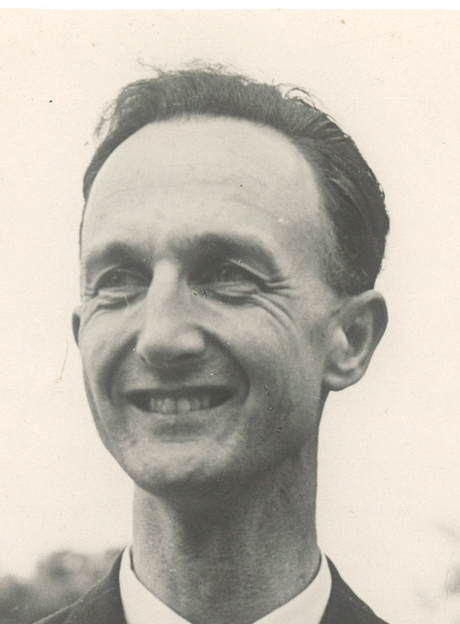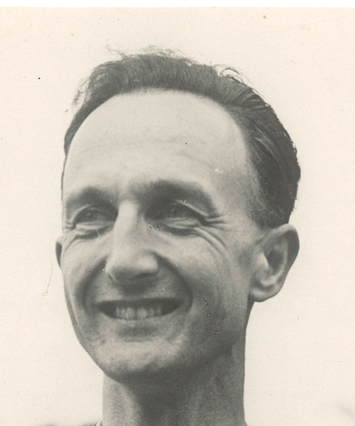I have known Frank Bygott for nearly 25 years – more than half of his all too brief life-span. Already when I first met him, he had begun to make his mark as a man of many gifts. Already too he had joined the devoted group of pioneers, most of them young Oxford men, who during the 1920s and early thirties gathered round Frank Buchman as the nucleus of a world force dedicated to the task of remaking the world. Already he had been to South Africa with one of the early groups of whose work Mr. J. H. Hofmeyr, for several years Deputy Prime Minister to Smuts, was later to say that it “started a major and continuing work for racial reconciliation throughout the country.”
The son of an old family, deeply rooted in the English countryside and the history of its people – a Bygott was one of the signatories of Magna Carta – he inherited an instinctive love of England and a profound sense of responsibility for her continuing destiny. At Oxford he was at once a classical scholar and a first-rate oarsman who rowed for his college and came close to winning a Blue. His affection for the Greek and Latin classics never left him. A copy of the Greek New Testament was always by his bedside. Those among his good friends who shared his classical education were as likely as not to find inside the birthday card which year by year he never failed to send them, a poem highly topical in its content and written in impeccable Greek elegiacs or Latin iambics. He was a skilfull writer of verse in many languages for he was a brilliant linguist: and several of his poems have been set to music and sung by vast audiences right across the world.
But of all Frank’s gifts the greatest was his gift for friendship – the kind of friendship which was apt to have momentous consequences for all who enjoyed it, because like all his gifts it was dedicated to enlisting men in the battle for a new world. Among the many who gathered to pay their last respects to him in the village church where his father had served for a generation as vicar, were scores for whom Frank’s friendship had meant a turning point in their lives – the clergyman who gave the address, the miners from Staffordshire and South Wales who bore his coffin to the grave, the miners leader who read the lesson, the son of an industrialist whose family life had been transformed through Frank from a hell into a heaven, the distinguished specialist from the Potteries, the medical officer from an industrial town, the docker from the Barry docks, his university contemporaries whose whole careers had been revolutionised through contact with him.
Growing to manhood during the inter-war years when unemployment and disillusionment were biting into the morale of Britain, Frank saw clearly that the future rested, for good or ill, with two groups of people above all – the workers and the youth; and it was to give these two groups a new moral backbone and a sense of destiny that he devoted his life. He was among the first to bring the message of the Oxford Group to East London, where it took such deep root that in 1938 Frank Buchman was invited to launch his campaign for Moral Re-Armament in the Town Hall of East Ham. At youth camps in the inspiration of which he played a great part in 1936 and 1937, hundreds of young men – students, workers and unemployed – found a constructive answer to apathy, a life of despair, of confusion and indifference, so that when war came in 1939 they had a positive faith for which to fight.
During the war years Frank himself joined the National Fire Service and volunteered for the mobile force which could be called at a moment’s notice to serve where the need was greatest. Yet even in the midst of these strenuous days he was thinking and building for the future. During his brief leave periods he travelled tirelessly in the Midlands and made lasting friendships with the miners and their leaders. It was these men who when war ended were among the first to see the importance of MRA to their newly nationalised industry and invited The Forgotten Factor to their coalfields. One of them later declared, “When MRA comes in, Communism goes out, absenteeism goes down and production goes up.”
From the mines of the English Midlands Frank Bygott went in 1948 to join the MRA force at work in the Ruhr. There his knowledge of German and his gift for friendship took him into the homes of men who had devoted their lives to militant materialist revolution. It was through men like Frank and his colleagues that they discovered in MRA what they themselves described as a superior ideology, so that Moscow Radio was forced to admit that Moral Re-Armament had “shown the capacity to capture radical and revolutionary minds.”
Such a record of achievement is itself remarkable in so short a life. Yet Frank Bygott was never interested in personal achievement; and his life will be remembered less for what he himself achieved than for what his friendship inspired others to achieve. He lives and will live in the lives of the many to whom he brought the power of God to change human nature. His friendships always started a chain reaction, more potent and far-reaching than that of any atom bomb.
An Indian doctor, who met him once, said after an interview in which he did most of the talking and Frank said only a few words, that he was the holiest man he had ever met. He had put his finger on something very fundamental in Frank’s life, something compounded of humility, honesty and dedication – but of something more besides.
For with all his strenuous and complete commitment to the battle for a new world, Frank Bygott always had about him the air of one who knew himself as a stranger and pilgrim here below, one who looked for a city which hath foundations, whose builder and maker is God. So when he knew that death was near he looked to the future not only with courage but with serene expectancy. One of his last acts was to write a letter to Frank Buchman committing himself afresh to the eternal battle. Frank Buchman cabled back, “We thank God for Frank. He lives a fighter to the end. He lives in the hearts and homes of the miners he loved. Many, in many lands who have been lighted by his spirit will fight the harder because of him.”
(This tribute appeared in the Stoke-on-Trent City Times on 15 April 1954)
English


